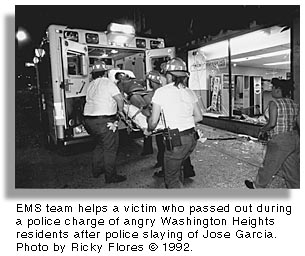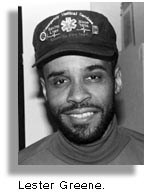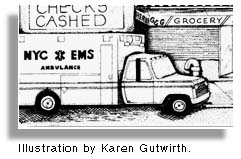|
EMS Is Becoming Ghetto Medicine
"We need an expanded community healthcare system" by Lester Greene New York City
In general, because of the poverty level, I think, and the economy, the number of people out of work, there seems to be more and more generally sick people - from elderly to pediatrics This is basic health care that these people need. We're the closest they've seen to a doctor. Either the emergency room or the emergency ambulance, - EMS (Emergency Medical Service) has become their doctor. This means these people should actually go to a doctor, if they had a primary physician to go to. But because most of the population we serve are uninsured people at the lower poverty level, they have no doctor. Like I say, the way to go to a doctor is to go in an ambulance, that's what they say. The large homeless population always go to city hospitals. EMS is becoming like ghetto medicine On the average, the EMS system receives anywhere from 2,000-3,000 calls a day. For the whole city, that's a million calls a year. Of these calls, major trauma is 20 percent. Eighty percent is minor injuries, minor sick, chronic sick, things like that. People will call an ambulance from everything - I have a cold for five days, I have had the flu for five days, people call an ambulance for that type of thing. And the City of New York has this thing where they must send an ambulance to respond. We need more primary care physicians, even create a part of the EMS system that would deal with non-emergency type of transport. If you remember the military days during Vietnam, if you were sick in the morning, you'd go see the medics. We should have something like that where you have an ambulance staffed by City workers who'd be at the shelters in the morning and people who were sick would be given medicine or taken to a doctor if necessary. In other words, expand the whole system. The significance of this is we should put on more qualified city workers and not farm the work out to the volunteer hospitals. These hospitals only run ambulances to take people to their hospitals. They only want to deal with rich and affluent people. The history of EMS
We serve the five boroughs (of New York) just like the police and the fire department but our staffing levels are a fraction of what theirs is. Our total street staff is maybe about 2,500-2,700 people compared to the police department which is over 50,000 people. On the average, throughout the city, there are under 100 ambulances on patrol at any one time. It's got to be under 100, 50-75. Also, it's projected, nationally, by the year 2000 that the majority of people doing this job will be women and people of color. In this country, EMS started right after the Vietnam War because the EMS system was developed for the Vietnam War. You always had medics but in that war you had a large volume of injuries and you had to start a pre-hospital, pre-emergency medical care. So you had field people. For instance, there's something the military uses when you go into shock which infuses blood from your lower extremities to your upper extremities to your heart and lungs so that you can live. These were developed in Vietnam because of the large injuries in the field and you couldn't Medivac people out right away, you had to stabilize them in the field. That's when emergency medicine started there. In a lot of ways the streets have become like Vietnam, especially the inner cities. I've been on the job nine years and once it was bad with the heavy drug thing, especially heroin, but since the crack outbreak in the last few years it's gotten even worse with the proliferation of guns. People have taken pot shots at the ambulance as it goes by, ambulances have taken bullets. Luckily nobody has been hit, but windshields have been hit, the ambulance body has been hit. There's been times when our crews have been assaulted. Some of our people wear bulletproof vests. We have Vietnam vets on the job who actually were in during the fighting time, and a lot of them have become very stressed out on this job. I don't know if they feel less control now than they did then, but now they seem like they can't handle it. In a military situation your whole environment is controlled. Here you have the job you have to do, but also you have to deal with the home environment. So if that's not under control, then the stress from that overlaps. I think that's the problem. If there's stress at home, you have that situation plus the stress on the job because of the bureaucratic stuff. You feel unappreciated. The EMS is a paramilitary organization. We have a rank structure with lieutenants, captains, chiefs. Public medicine
When a person gets shot or stabbed, they need a doctor, that's what they need, a person that's trained to stop internal bleeding. All I can do in the field is stabilize them. But there's a saying in the street that a good paramedic is not made by trauma, but by medical calls, sick calls. For sick calls you diagnose, look at what's the person signs and symptoms are, and you figure out whether they have an MI, a heart attack, a stroke, whether they're diabetic, in insulin shock – these are diagnosis calls that you make based on the training you get. Trauma is like 1,2,3, - package them and get them to the hospital because that's what they really need. So to me, having a broader field, a broader work in medicine would be better for us and it would be job security. If we were to have smaller clinics, people wouldn't have to go to emergency rooms. The emergency rooms have been tied up, and if you're going to the hospital to spend five to six hours because there's no stretchers in the emergency rooms, the emergency room is being used like a clinic. We should have expanded clinics in the communities that EMS people could staff. This would be possible because often our people cannot work the ambulance anymore because they get hurt on the job. Many EMS people are hurt with bad back injuries, a good 51 percent of our injuries are back-related injuries. We need to deal with people in shelters, the homeless, people who don't have access to medical facilities. We need to deal with them on a more realistic level so they're treated prior to their injuries getting out of hand, and in more of an educational way, with clinics. We should still be an emergency medical service but with an expanded role in community health. Photo of Lester Greene by Nic Paget-Clarke. |
| Published in In Motion Magazine November 16, 1997. |
If you have any thoughts on this or would like to contribute to an ongoing discussion in the  What is New? || Affirmative Action || Art Changes || Autonomy: Chiapas - California || Community Images || Education Rights || E-mail, Opinions and Discussion || En español || Essays from Ireland || Global Eyes || Healthcare || Human Rights/Civil Rights || Piri Thomas || Photo of the Week || QA: Interviews || Region || Rural America || Search || Donate || To be notified of new articles || Survey || In Motion Magazine's Store || In Motion Magazine Staff || In Unity Book of Photos || Links Around The World NPC Productions Copyright © 1995-2020 NPC Productions as a compilation. All Rights Reserved. |


 Lester Greene is a member of the Executive Board of Local 2507 EMT (Emergency Medical Technicians) and Paramedics of NYC EMS (New York City Emergency Medical Service). This article is taken from an interview by
Lester Greene is a member of the Executive Board of Local 2507 EMT (Emergency Medical Technicians) and Paramedics of NYC EMS (New York City Emergency Medical Service). This article is taken from an interview by  The history of EMS is that we've been around for 26 years and the whole system itself is still in its infancy. The fire and police departments have been around for 100+ years.
The history of EMS is that we've been around for 26 years and the whole system itself is still in its infancy. The fire and police departments have been around for 100+ years. From my perspective here at the local, I feel that EMS is public medicine. I don't think it's a real emergency medical service. We do very good medical work, we're proud of that, and we're trained on that. We can handle most situations. But it's like we're health care workers in the field.
From my perspective here at the local, I feel that EMS is public medicine. I don't think it's a real emergency medical service. We do very good medical work, we're proud of that, and we're trained on that. We can handle most situations. But it's like we're health care workers in the field.